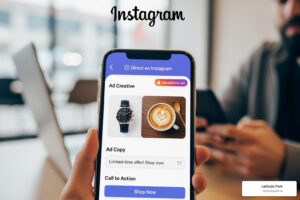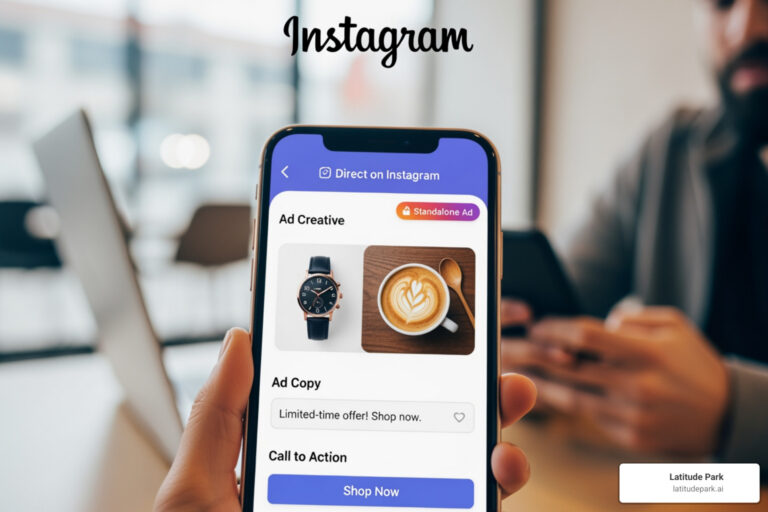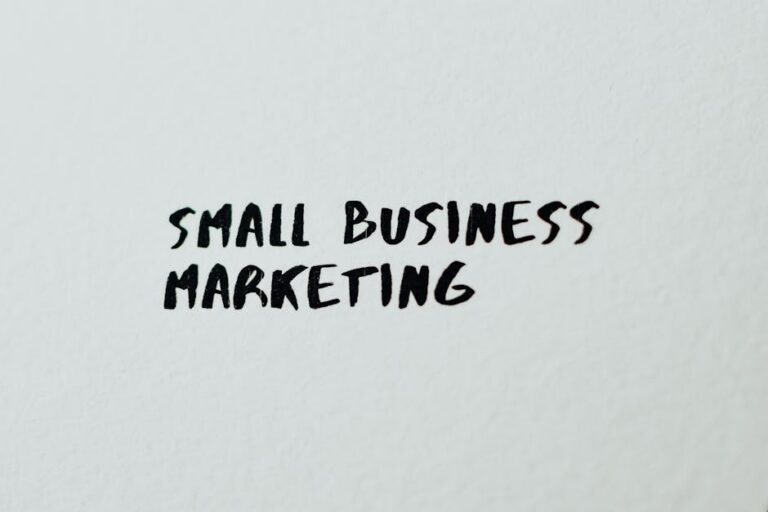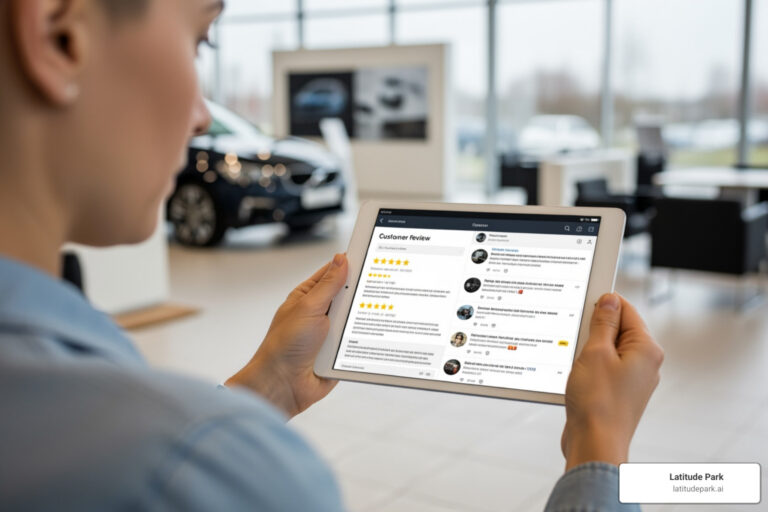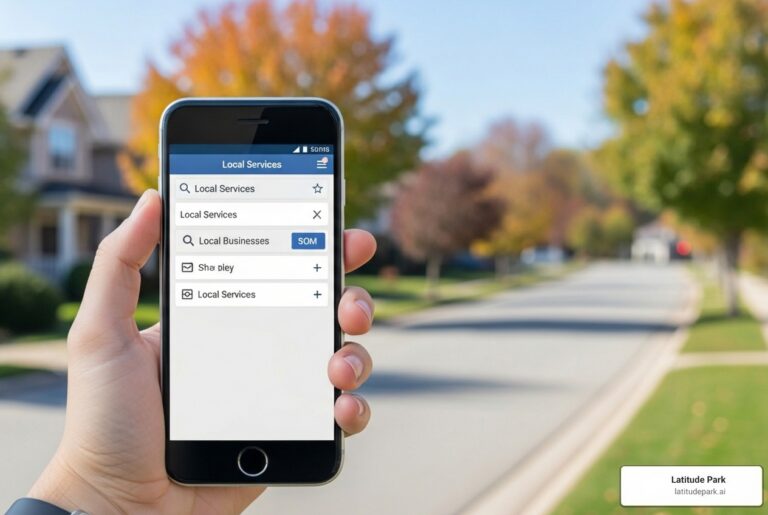When people talk about outsourcing digital marketing, they mean bringing in an external agency or specialist to run their online promotional efforts. It’s a strategic decision that lets a business tap into expert-level skills in things like SEO, paid ads, and content creation, all without the overhead of hiring a full-time in-house team. This ultimately frees up your own people to focus on their core jobs.
Why Smart Companies Outsource Digital Marketing
Forget the tired "it saves money" argument for a second. The real strategic wins behind outsourcing go much deeper. For any company focused on growth, the choice isn't just about cutting costs—it's about gaining an immediate, powerful competitive edge. You get instant access to a full team of specialists, from SEO wizards to paid ad gurus, without the months-long headache of recruiting, hiring, and training them yourself.
This is part of a much bigger shift in how businesses operate. The global outsourcing ecosystem is on track to hit a staggering USD 450 billion by the end of 2025. That number signals a fundamental change where companies are choosing to source specialized skills externally instead of trying to build everything from scratch.
Gaining a Strategic Partner, Not Just a Task Manager
Let me paint a picture for you with a practical example. I’ve seen this happen with countless B2B SaaS startups. Their small in-house team, though incredibly talented, was completely fried. They were trying to juggle everything from writing blog posts to managing complex ad campaigns. Their marketing manager was spending half her day trying to figure out Google Ads bidding strategies instead of focusing on the big picture. They were stuck in a reactive cycle, just ticking off tasks instead of building a cohesive strategy that actually moved the needle.
When they finally partnered with an agency, they didn't just get more hands on deck. They gained a strategic partner. The agency came in, analyzed their entire lead generation funnel, uncovered new audience segments they’d completely missed (like targeting specific job titles on LinkedIn they hadn't considered), and fine-tuned their ad spend to squeeze out a better ROI.
The true value of outsourcing is unlocking a team that thinks strategically about your business goals. They bring an outside perspective that can challenge assumptions and uncover growth opportunities your internal team might be too close to see.
This freed up the startup’s core team to get back to what they do best: improving the product and delighting their customers. The result was a far more efficient marketing engine and a less stressed, more productive internal team. It's no surprise that a huge driver for businesses looking to outside partners is the challenge of how to manage multiple social media accounts effectively without creating that kind of internal chaos.
Unlocking Unmatched Agility and Scalability
Another game-changing benefit is the sheer agility an external partner provides. Think about it: an in-house team has a fixed capacity. Hiring more people for a short-term push, like a major product launch, is wildly impractical and expensive.
An outsourced team, on the other hand, offers incredible flexibility. Here’s how that plays out in the real world:
- Scaling Up: Imagine you're a retail company heading into the Black Friday season. An agency can instantly deploy more resources—more ad specialists for a high-volume PPC campaign, content creators for gift guides, and social media managers for flash sales—to maximize your impact during that critical launch window.
- Scaling Down: Once the holiday rush is over, you can dial those resources right back to a maintenance level. No need to deal with layoffs or figure out what to do with underutilized full-time staff in a quiet January.
This ability to scale on demand is something that's nearly impossible to achieve with a traditional in-house structure. It gives you a powerful tool to adapt to market changes quickly and efficiently.
The Growing Shift to Outsourced Marketing Teams
Pivoting to an outsourced digital marketing team isn't just a fleeting trend anymore; it's a fundamental shift in how smart businesses operate. Several market forces are making external partnerships a more strategic—and often necessary—move than ever before. At the heart of this change is a glaring talent gap.
The global demand for highly specialized digital skills, like data analytics, conversion rate optimization, and advanced SEO, is absolutely exploding. The problem? It's dramatically outpacing the available talent pool. For many businesses, the cycle of finding, hiring, and retaining experts in these niche areas is a constant, expensive struggle. Agencies have become the answer, offering immediate access to pre-vetted specialists who are at the top of their game.
The Technological and Strategic Divide
Let's be honest: modern marketing runs on a sophisticated and often pricey set of tools. High-end martech stacks, often powered by AI and predictive analytics, give companies a serious competitive advantage. But the licensing fees for platforms like HubSpot, SEMrush, or Ahrefs at an enterprise level, and the specialized training required to actually use them effectively, are frequently beyond the budget of most in-house teams.
When you bring on an agency, you're not just hiring people; you're gaining access to their entire technological arsenal. This gives your business an immediate leg up.
- Precision Targeting: Agencies use advanced data tools to pinpoint and reach incredibly specific audience segments, which means less wasted ad spend for you. For example, they can build custom audiences in Facebook Ads based on website visitors who viewed a specific product but didn't buy.
- Performance Measurement: They rely on powerful analytics platforms to deliver clear, measurable insights into campaign performance, moving beyond fuzzy "vanity metrics" to track what really matters: your ROI.
- Competitive Analysis: With top-tier software, they can monitor what your competitors are doing in real-time—like seeing which keywords they're bidding on or which backlinks they just acquired—allowing for quicker and more informed strategic decisions.
As companies weigh their next move, exploring different marketing team structures often shines a light on why the outsourced model is becoming so popular. It provides a ready-made framework for excellence without the years of internal build-up.
This shift is less about just offloading tasks and more about plugging into a high-performance marketing engine. It’s a strategic decision to acquire capabilities that would take years and a massive investment to build from scratch.
A Market Responding to Demand
The numbers don't lie—they paint a clear picture of this strategic migration. The global digital marketing outsourcing market is seeing explosive growth, projected to surge from USD 25.4 billion in 2024 to an estimated USD 74.76 billion by 2034. That's a powerful compound annual growth rate of 11.4%, with sectors like IT and telecommunications leading the charge.
The chart below shows the market's projected growth, highlighting its accelerating momentum.

This data confirms what we're seeing on the ground: businesses are increasingly relying on external partners to stay sharp and competitive. By tapping into this trend, you can get access to some of the same effective digital marketing tips for businesses that industry leaders are using to drive their own success.
Finding a Marketing Partner You Can Trust
Deciding to outsource your marketing is a huge step. But the real work? That starts when you begin the hunt for the right team. This isn't about finding a vendor to just check boxes and run campaigns; it's about finding a genuine partner who will plug into your business and drive actual growth.
Your selection process needs to be tough. You have to look past the slick sales decks to find a team that truly gets what you’re trying to achieve.
Look Past the Logos
A great place to start is their case studies, but don't just get dazzled by the big-name clients. Look deeper. Do their success stories show a clear method that would actually work for your business?
If they’re boasting about a 400% increase in traffic for an e-commerce brand, you need to dig into how they pulled it off. Was it through a long-term content strategy focused on high-intent blog posts? Or was it a quick-hit paid ad blitz on TikTok that you can't afford and doesn't fit your brand? The "how" is more important than the "what."
You're looking for proof of a strategic process, not just flashy, disconnected results. This is what a well-oiled marketing system looks like—a blend of interconnected skills working toward one goal.
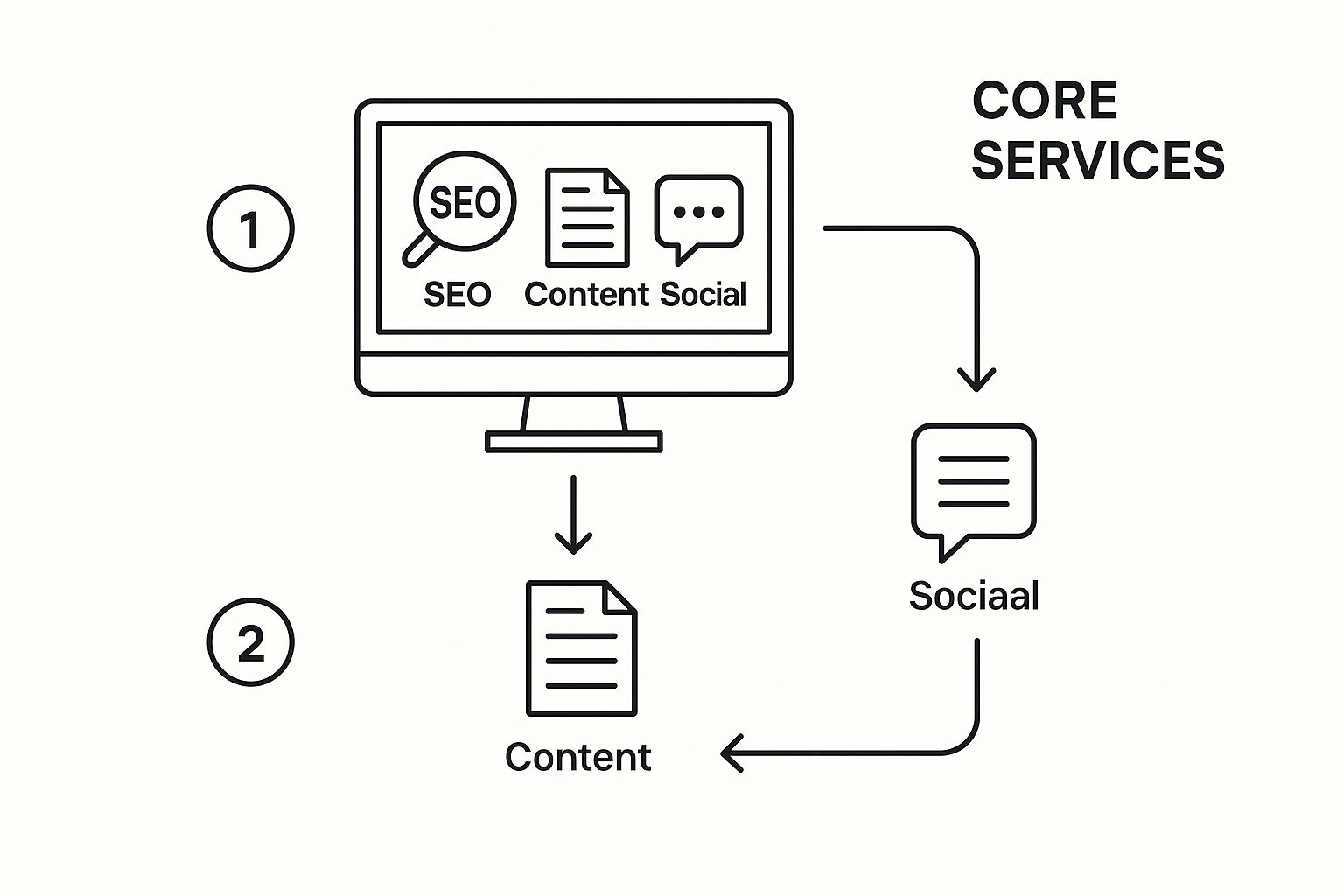
Effective marketing isn’t just one thing. It's a whole system of specialized skills pushing in the same direction.
Asking the Right Questions in Discovery Calls
Once you have a shortlist, the discovery call is your chance to cut through the fluff. Come prepared with specific, challenging questions that reveal how they think, how they handle pressure, and what success actually looks like to them. Generic questions will only get you generic answers.
Instead of asking, "What results can you get us?", try these:
- "Walk me through a time a campaign went south. What were the exact steps you took to turn it around?" This question reveals their problem-solving chops, honesty, and accountability. A practical example: they might explain how a Google Ads campaign's cost-per-click suddenly spiked, and how they identified negative keywords and adjusted ad copy to bring it back in line.
- "How, specifically, will you connect your marketing efforts back to our revenue goals?" This forces them to think beyond vanity metrics like "likes" or "impressions." Their answer should be all about tracking conversions, lead quality, and customer lifetime value using tools like Google Analytics goals or CRM integrations.
- "What will you need from my team to succeed, and what does your ideal client relationship look like?" This sets expectations from day one and helps you figure out if your company cultures will even work together. Do they need weekly check-ins? Access to your sales team? This clarity is vital.
A truly confident and capable agency will welcome tough questions. They'll have clear, data-backed answers and will be just as interested in figuring out if you're the right fit for them.
Agency Evaluation Checklist
To keep things objective, use a simple checklist to compare your top contenders side-by-side. This helps you move beyond a "gut feeling" and make a decision based on concrete criteria.
| Evaluation Criterion | Agency A | Agency B | Notes/Red Flags |
|---|---|---|---|
| Industry Experience | Do they understand our niche? | ||
| Case Study Relevance | Are their success stories similar to our goals? | ||
| Strategic Approach | Did they outline a clear, logical process? | ||
| Communication Style | Proactive updates vs. waiting for us to ask? | ||
| Reporting & Transparency | Are reports clear and tied to business goals? | ||
| Team Expertise | Who would actually be working on our account? | ||
| Cultural Fit | Do we see ourselves collaborating with them? | ||
| Reference Feedback | What did their past clients say? |
This structured comparison will make your final decision much clearer and less biased.
Verifying Social Proof and Communication Style
Finally, don't just take their word for it—verify everything. Real social proof is more than a few glowing testimonials on their website. Dig into third-party review sites, look for detailed client interviews on other platforms, and most importantly, ask for references.
When you talk to their clients (past or present), don't just ask if they were "happy." Get specific. Ask about their communication style and how transparent the reporting was. For example, "Did their monthly reports clearly show how ad spend was translating to leads, or was it just a list of clicks and impressions?"
If you're hiring for a specific channel, it's also smart to understand how to choose the best social media marketing agency by asking references about their experience in that area. Finding a partner with the right technical skills and the right communication habits is the bedrock of a successful, long-term relationship.
Integrating Your New Agency for a Strong Start
Signing the contract isn't the finish line; it’s the starting block. The success of your partnership really hinges on what happens next, and a disorganized onboarding can kill momentum before it even gets going. Building a strong foundation from day one is what turns a simple agreement into a true, growth-focused partnership.
Your new agency can't read minds. They need a clear roadmap of your business, brand, and customers to start getting you results. A smooth integration requires you to be an active participant, not just a passive observer. This hands-on approach is what sets the stage for success when you outsource your digital marketing.

Building Your 30-Day Onboarding Plan
The first month is make-or-break for aligning expectations and arming your new team with the right tools and information. Instead of a chaotic back-and-forth of emails, create a structured onboarding checklist. This makes sure nothing slips through the cracks and helps them make an impact, faster.
Here's what your agency absolutely needs from you:
- Platform Access: Grant them user access to your Google Analytics, ad accounts (like Meta and Google Ads), social media profiles, and any marketing automation software you’re using. Forgetting to grant access to Google Tag Manager, for instance, can delay conversion tracking setup for weeks.
- Brand Assets: Set up a shared folder with your official logos, brand style guide, font files, and any existing marketing collateral or high-quality imagery. Providing a document with examples of "do's and don'ts" for brand voice is incredibly helpful.
- Customer Insights: Share your detailed customer personas, voice-of-customer data (like survey results or interview transcripts), and any market research you've already done.
This level of prep work is non-negotiable. It's a common theme across the business process outsourcing (BPO) world for a reason. Just look at the global IT outsourcing industry, which covers services like data analytics and SEO—it saw a 13% growth spurt between 2020 and 2021 alone, with projections to top USD 500 billion by 2025. This growth is built on streamlined processes, and you can learn more about outsourcing trends and statistics to see how this plays out across different sectors.
Establishing Effective Communication Rhythms
Miscommunication is the silent killer of agency partnerships. The best way to avoid it is to establish clear and consistent communication channels right from the start. This isn't about more meetings; it's about smarter, more focused conversations.
I remember a retail brand we onboarded that ran into this exact problem. Early on, we realized their definition of a "qualified lead" was completely different from ours. The agency was focused on top-of-funnel inquiries (like newsletter sign-ups), while the client needed sales-ready prospects (people who requested a demo). We quickly scheduled a workshop to collaboratively define the term with specific criteria, which probably saved months of misaligned effort and wasted ad spend.
Set up a shared project management board (like Asana or Trello) for daily transparency and schedule bi-weekly performance calls. These calls should focus on progress against key performance indicators (KPIs), not just a laundry list of completed tasks. This keeps everyone accountable and laser-focused on what truly matters: business results.
Common Outsourcing Mistakes and How to Avoid Them
Even the most promising partnerships can go sideways if you fall into a few common traps. When you outsource your digital marketing, you’re not just buying a service; you’re building a relationship. Avoiding a handful of key mistakes can be the difference between a frustrating waste of money and a partnership that drives real growth.
One of the biggest pitfalls I see is the "set it and forget it" mindset. You hire an agency, hand over the keys, and then disappear, expecting magical results to just happen. This almost never works. Marketing is a collaborative process, and your agency needs your input and feedback to truly succeed.
I remember one company that gave their new agency almost no direction on brand voice. The agency, working in a vacuum, launched a social media campaign that was technically sound but tonally all wrong. The posts were full of corporate jargon when the brand's established voice was casual and witty. The posts felt generic and didn't resonate with the company's loyal customer base, leading to weeks of wasted effort—all because of a simple communication gap.
The Dangers of Vague Goals
Another classic mistake is setting ambiguous goals. Telling your agency you "want more traffic" or "need to grow our social media" sounds like a clear objective, but it's not. These are vanity metrics that don’t always translate into actual business results. An agency can easily boost your traffic with low-quality visitors who never convert.
Instead, your goals must be tied directly to business outcomes.
- Vague Goal: "Get more website traffic."
- Specific Goal: "Increase organic traffic to our key service pages by 25% and achieve a 5% conversion rate on demo requests from that traffic within six months."
This level of specificity forces your agency to focus on attracting the right audience and gives you a clear benchmark to measure their performance against. Without it, you’re just paying for activity, not results.
Choosing Price Over Value
It’s tempting to go with the cheapest agency you can find, but this is often the most expensive mistake you can make. A low price tag can be a red flag for inexperienced teams, overworked staff, or hidden fees that conveniently pop up later. Quality marketing requires expertise, strategy, and time—all of which have a cost.
Choosing the cheapest option often means paying twice: once for the initial poor-quality work and again for a better agency to come in and fix it. Prioritize value, expertise, and a clear strategic plan over a rock-bottom price.
Similarly, it's crucial to establish clear ownership of your digital assets from day one. You should always retain administrative control over your Google Analytics, ad accounts, and website. A reputable agency will work within your accounts, not create their own that they can hold hostage if the relationship ends. For a deeper dive, you can explore other common yet disastrous online marketing mistakes and how to avoid them. Taking these proactive steps ensures your partnership is built on a foundation of trust and transparency.
Frequently Asked Questions
Diving into a partnership to outsource your digital marketing is a big step, and it naturally brings up a lot of questions. We get it. Below are some straightforward answers to the queries we hear most often from business owners weighing their options.
How Much Does It Cost to Outsource Digital Marketing?
This is always the first question, and the honest-to-goodness answer is: it depends. The investment can range from a few hundred dollars a month for some basic social media help to tens of thousands for a comprehensive, multi-channel strategy run by a top-tier agency.
Pricing models vary quite a bit, too. You’ll typically see a few common structures:
- Monthly Retainers: A fixed fee you pay each month for an agreed-upon set of services. For example, a $5,000/month retainer might include SEO, content creation for two blog posts, and management of a $10,000/month ad spend.
- Project-Based Fees: A one-time cost for a specific, defined project, like a $15,000 website redesign or a $3,000 deep-dive SEO audit.
- Performance-Based Pricing: Here, the agency’s fee is tied directly to the results they generate, like taking a percentage of ad spend or charging a fee for each qualified lead they generate.
Ultimately, what you'll invest depends on the scope of services you need, the agency's experience level, and just how aggressive your growth goals are.
Will I Lose Control Over My Marketing?
That’s a completely valid concern, but a good partnership is built on collaboration, not abdication. You shouldn't feel like you're losing control; you should feel like you've gained a strategic ally who’s in the trenches with you.
A quality agency will work with you. For example, they might present three different concepts for a new ad campaign and ask for your feedback and approval before launching anything. They’ll provide regular, easy-to-understand reports, ask for your input, and make sure every part of the strategy aligns with your brand’s vision and voice.
The goal isn't to hand over the keys and walk away. It's to bring in an expert co-pilot who can navigate the complexities of digital marketing while you remain firmly in the captain's chair, setting the destination.
You will always have the final say on major campaigns, budget decisions, and core messaging. The agency's role is to bring the expertise and execution to make your vision a reality, effectively and efficiently.
What Results Can I Realistically Expect?
The results you'll see depend entirely on your starting point, your budget, and the strategies you put in place. It's absolutely crucial to set realistic expectations right from the start.
For example, SEO is a long game. If you're a brand new website, you might not see a huge jump in organic traffic for six months or more. It’s about building a foundation for sustainable, long-term growth.
On the flip side, a well-optimized paid advertising campaign on platforms like Meta or Google can start generating leads within days. A reputable agency will help you establish clear, measurable Key Performance Indicators (KPIs)—like "achieve a cost-per-acquisition of under $50"—and give you a realistic timeline for hitting them, so you always know what success looks like and how you're tracking toward a solid ROI.
Ready to stop juggling all those marketing tasks and start seeing real, measurable growth? The team at Latitude Park specializes in creating and managing high-performance ad campaigns and SEO strategies for businesses just like yours. Let's talk about building a marketing plan that works for you.


